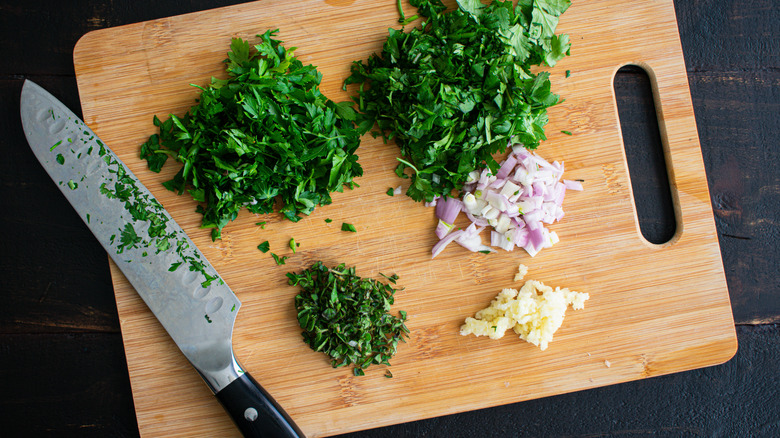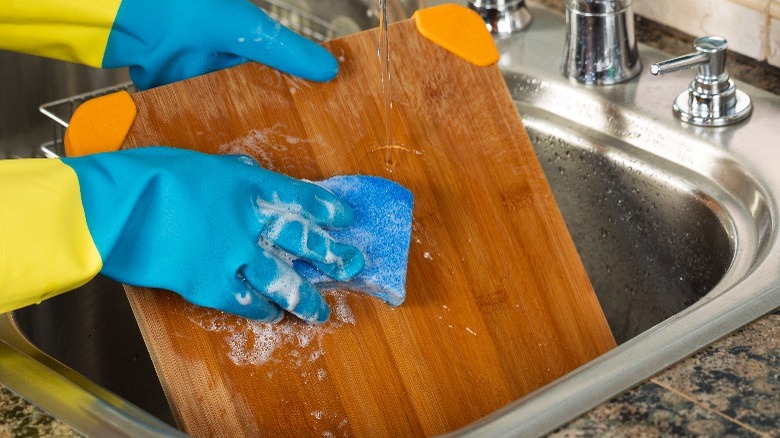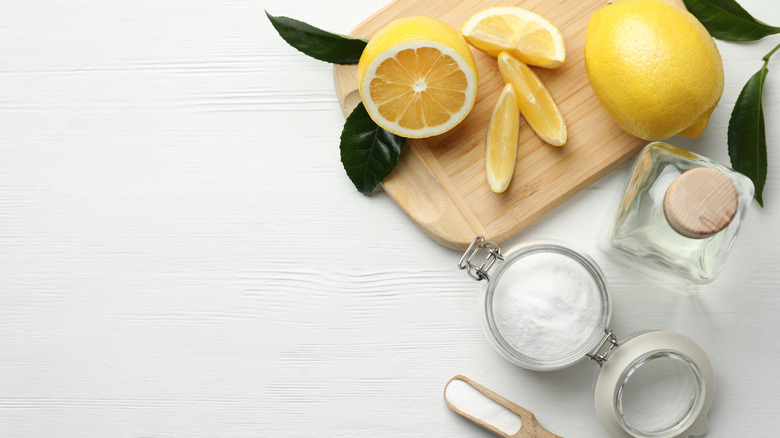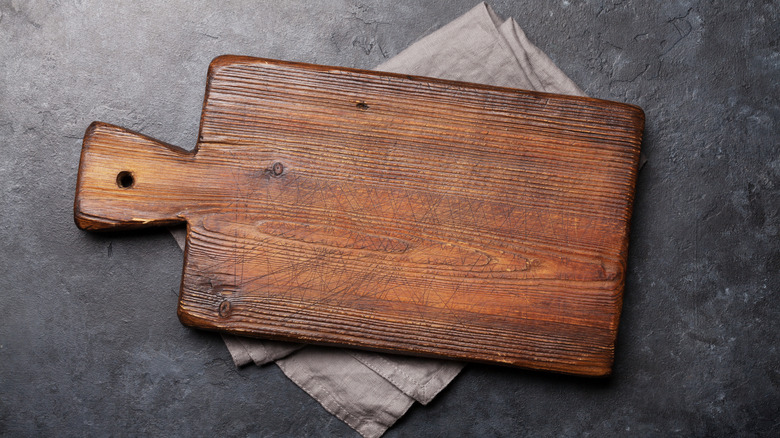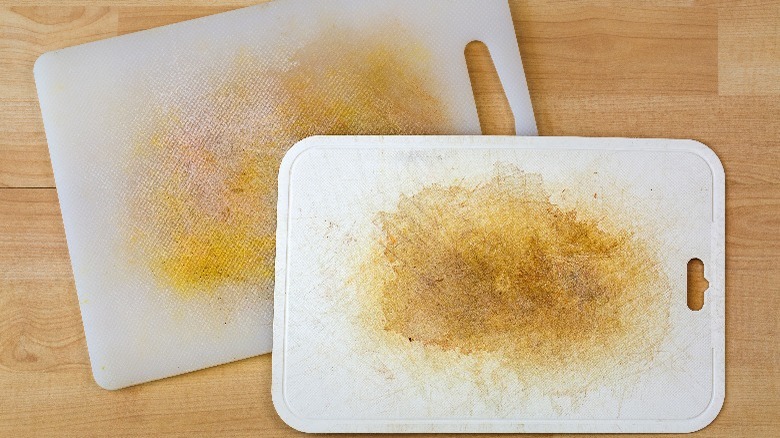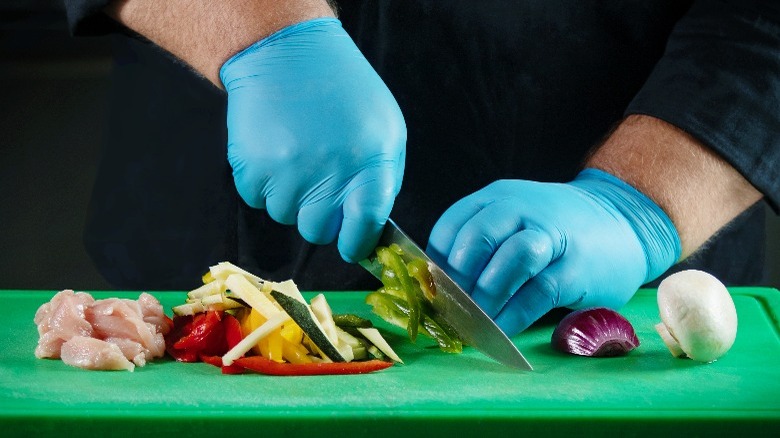Signs It's Time To Replace The Cutting Boards In Your Kitchen
When was the last time you invested in a new cutting board? If you've been using the same one of these useful kitchen implements for years, you may be surprised at how gross that piece of plastic, wood, or glass is. According to Express, cutting boards can be home to more fecal matter than your toilet! Not only that, but if you're not using a different board for chicken than your veggies, you're at risk of spreading other toxins into your meals. Cutting boards are a haven for bacteria, and they only worsen over time. It would be best if you were replacing your cutting boards every year.
While you should be cleaning your cutting boards after every use, there are some great tips that can make them last longer. How you wash them and how often they need replacing depends on what material they've made from. Wood, plastic, and glass cutting boards all have different life expectancies and various ways to keep them clean, germ-free, and stink-free.
When cleaning your board takes more effort
Since cutting boards are one of the germiest places in your kitchen, you should have more than one. According to Taste of Home, you need a separate board for meat because raw meats have all sorts of bacteria that can spread to your other food items. While the bacteria die when you properly cook the meat, they may not die when cooking the vegetables and other food items that have come in contact with the microbes. They can also live on the cutting board even after washing.
Always clean your cutting boards with hot water and dish soap. Allrecipes breaks down the cleaning instructions for different cutting boards, making the task easier to maneuver. Composite or glass cutting boards are made from a glass-like resin material and are the one type of cutting board that is entirely safe to wash in the dishwasher. Of course, you should clean every cutting board immediately after use, so if you do not intend to wash a load, hand wash them in the sink. Wood and bamboo cutting boards should never be put in the dishwasher. It can cause warping, and they may hold water driving more bacteria growth. Be sure to hand dry right away, too. Conversely, you can wash your plastic cutting board in the dishwasher, but the high heat can cause warping over time.
You're removing stains and smells regularly
If you have a stinky cutting board, you may have the inclination to toss it and buy another one. If that board isn't a year old yet, consider trying some tricks to remove the odors and stains before you invest in a new one too early. LifeSavvy has a somewhat comprehensive list of ways to get rid of stubborn smells from cutting boards of all kinds — and it's not just the wood ones that harbor stinky germs and bacteria. The good thing is that you probably have all of the ingredients to make your cutting board smell more pleasant on hand already. You'll want at least one or more (depending on how tough the stains and odors are) of the following: lemon, salt, baking soda.
You can use the lemon alone, and it will help deodorize and battle pesky stains. Pairing it with salt will help get the lemon deeper into the cutting board, but salt can also cause abrasions on your board and give germs more places to hide. Baking soda is a wonderful "go-to" for all sorts of household kitchen cleaning projects.
Your cutting board has lots of deep cuts and scrapes
When your cutting board is full of deep scratches, it has more places for bacteria to hide and makes it more challenging to clean it properly. At this point, it may be best to get a new cutting board, no matter how old the mangled one is.
However, if you have a wood cutting board with lots of scratches, there's a chance you can give it a longer life by refinishing it. If you have the right tools on hand and the time to do a little sanding, you can make an old wood cutting board new again. SFGate has the instructions for refinishing wood cutting boards. Look into the items you'll need to make this happen, like sandpaper and mineral oil, and determine if you'd be spending more money fixing your current board than you would be buying a replacement. But you should also consider the fact that these refinishing items may last you a few years, and you'd otherwise be replacing your wood board yearly.
It's been a year since you got the cutting board
Here's where it gets dicey; some cutting boards need replacing more often than others. While yearly replacement is a good general rule, some may last longer. Plus, it depends on how often you're using your cutting boards and how well you're caring for them.
Kitchen Seer gives a nice overview of the different cutting board replacement times. For plastic, you should replace them every one to five years, whereas wood will last much longer with proper care. Much like the five-day "when in doubt, throw it out" leftover food rule, use the one-year rule for ensuring your cutting board isn't contaminating your kitchen. It's better to spend a few bucks on a replacement rather than spend time in the emergency room with food poisoning because you kept using a cutting board full of bacteria. No one wants that risk!
Picking a new cutting board
If you're ready to toss your old cutting board and are looking for replacements, there are two things for you to consider. First, wood cutting boards last longer but need more care to do that. And plastic cutting boards need to be replaced more often. While wood boards look nicer, they also tend to cost more than plastic cutting boards. That means you also want to consider how much money you have available to invest in this kitchen must-have right now. Not mentioned earlier are stone cutting boards, but they tend to have the same issues as the composite boards — they can still get fine cuts in them where bacteria can hide.
According to Fine Dining Lovers, rubber cutting boards are the way to go and are prevalent in professional kitchens. While rubber cutting boards can get scratched, they aren't as scratch-prone as plastic boards. They require less upkeep than a wood board. But, you'll still want to consider that yearly replacement, and it is still essential to properly clean your rubber cutting board after each use.
